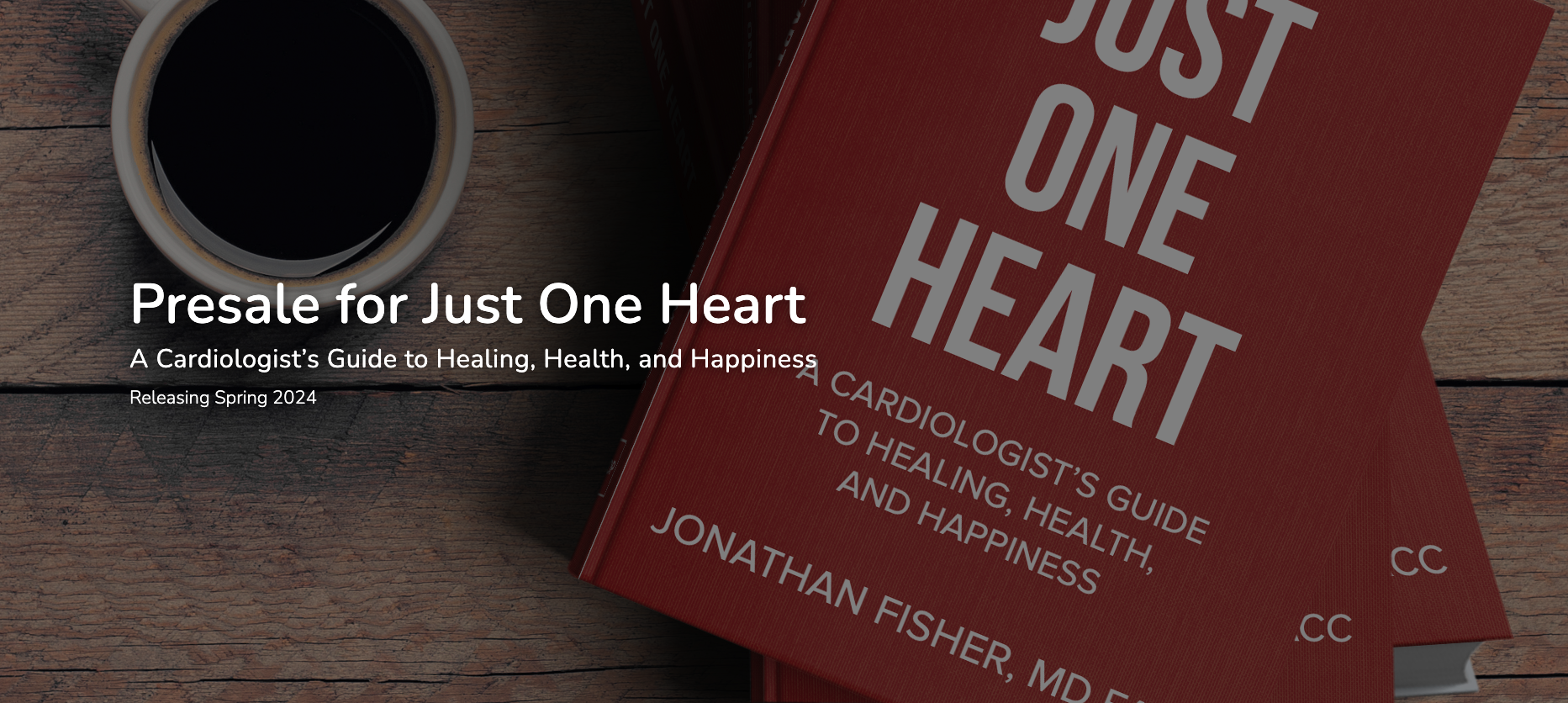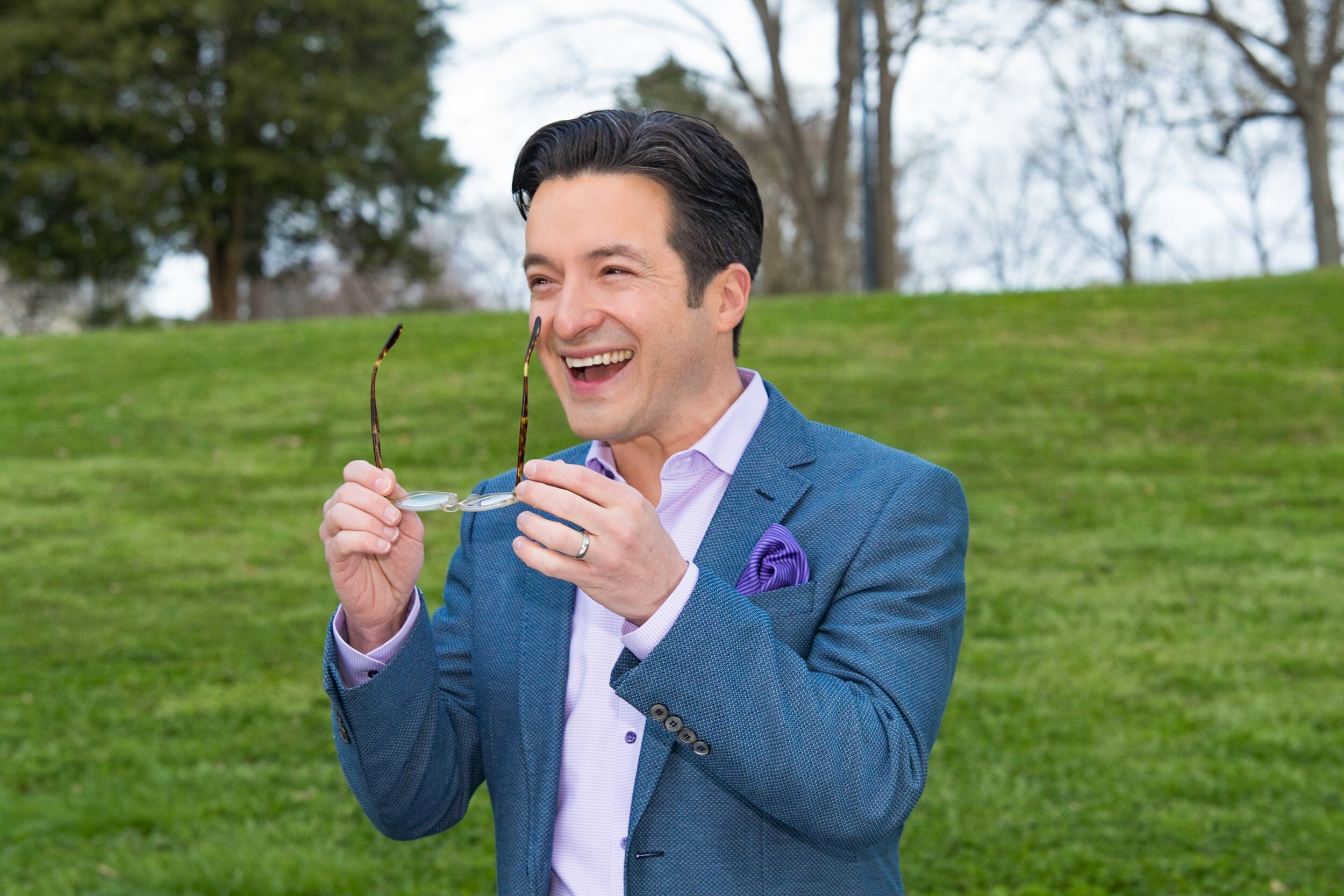Transforming Leadership & Well-Being From The Heart
At the About my Brain Institute, our core belief has been that “better brains create better leaders.” However, it is worth exploring the notion that a “better heart” could potentially be the crucial factor in nurturing exceptional leaders. To gain further insights into this perspective, I decided to consult with an expert in the field.
I recently had the privilege of speaking with Dr. Jonathan Fisher from Charlotte, North Carolina. Dr. Fisher is a clinical cardiologist, certified mindfulness teacher, and well-being and resilience leader at Novant Health, supporting a team of 38,000 people. His book, “Just One Heart: A Cardiologist’s Guide to Healing, Health, and Happiness,” will soon be available in 2024.
Needless to say, his qualifications are numerous, and I was very excited to speak with him. To give us a sense of his message, we stepped back in time to his childhood.
The Youngest of Seven in a World of Science and Medicine
As the youngest of seven, Dr. Fisher’s parents taught their children to honor and respect science. His father was a chemical engineer who became the town doctor in New Jersey. His mother was a nuclear physicist in the 1950s, an unusual endeavor for women in that time period.
Each of his siblings eventually followed their parents and found careers in the sciences. In love with physics and biology, Jonathan felt that practicing medicine would allow him to help others. Cardiology, specifically, allowed him to use his knowledge of physics and hydromechanics to better support patients.
In his work, he realized that many of us do not treat our hearts kindly. We may not exercise enough (or at all), we might not eat the best foods, we might smoke cigarettes, or indulge in too much alcohol. Between obesity, diabetes, and high blood pressure, we have a major health crisis.
Heart disease is now the number one killer of men and women worldwide. Jonathan feels that this is happening because we are out of connection with our hearts, with our physical hearts.
It is not enough to simply take care of the physical heart with proper sleep, nutrition, and exercise. He had many patients who did all of these things, but they still came in with heart attacks. So, what was going on?
The Connection Between the Physical Heart and the Emotional Heart
Finally, he understood what people have realized for thousands of years. The physical heart is connected to the emotional heart. The emotional heart is also influenced by our social and spiritual connections.
In his book, “Just One Heart,” he discusses a new holistic approach to healing our hearts, both physically and emotionally. Cardiology has come so far in recent years. Valves are commonly replaced. Invasive open heart surgery is not always the answer, as minimally invasive options are now standard.
Some of the Basics are Missing--Empathy and Compassion
However, when we consider only the physical heart, we neglect the emotional heart. Why are we not emphasizing empathy and compassion and prioritizing our social relationships? Why are the emotional aspects of this miraculous organ so often overlooked?
I had many questions for Jonathan during our conversation. Every heart has neurons, but has there ever been an analysis of the difference between compassionate people and those who are not? Is there a difference in the number of neurons, or are the connections between the heart and brain different in people who are more or less compassionate and empathetic?
Jonathan answered my questions honestly. He admitted that while research has progressed greatly, there is still so much we do not know. The heart does have nerve cells, but so do all parts of our body. These nerve cells create awareness as messages are relayed back and forth between the body and mind.
Do Compassionate People Have Different Hearts?
The answer to this question was yes, in the metaphorical emotional sense. People who are more compassionate tend to see less separation between themselves and others. They tend to have more of a sense of belonging with nature, and they tend to have an overriding and overarching concern for the well-being of other people.
According to neuroscience, people who are more empathetic and compassionate have different brains. These types of brains communicate with their hearts in different ways. If someone is more fearful, avoidant, and less concerned with others, their amygdala (responsible for fight or flight) may be more active.
If someone is more empathetic to others, the anterior insular cortex tends to be either more developed or more active, depending on the scans used. More compassionate people have been studied, such as the Buddist monk Matthieu Ricard, dubbed “the happiest man in the world.”[1]
Brain behavior in people like this looks different. The left prefrontal cortex is more active when people exert empathy and compassion, as opposed to more primal parts of the brain, such as the amygdala, when people feel disconnected.

The Connection Between the Heart and Brain
There are many different highways of information between the heart and the brain. Nerve signals, chemicals in the body, or emotional energy in a moment are all used. For example, if our heartbeat speeds up, we are aware of this in the brain, and we might develop some anxiety or excitement as we process what is happening.
We use this information to create a story around what is happening inside us. One leader whose heart is beating faster may tell a story of nervousness, fear, or anxiety. The rapid heart rate will then continue to be fast, perpetuated by signals from the brain. The amygdala is in overdrive, keeping those negative feelings coming.
Another leader may interpret the faster heartbeat as excitement and readiness to lead others. In this case, the brain doesn’t dwell on the negatives, and the heart will calm down. The amygdala is quiet as the other parts of the brain take over.
Emotions are Contagious
As a leader, we must realize that emotions are contagious. This is so easy to see in a variety of environments. Leaders who are nervous and agitated are easy to spot by the people around them. Anxiety will spread, as people may be wondering why the leader is behaving in such a manner. Their own heartbeats may speed up, and they may begin imagining worst-case scenarios in their minds.
When leaders are in a good mood and exude positive energy and emotions, people tend to follow them. Adopting a sense of calm (and not just faking it) creates a connection with other people. This supports a growth mindset and the idea that things will be okay.
This sense of steadfastness and calm is contagious and can spread exactly like negative emotions. Instead of making people fearful and anxious, we can promote a sense of calmness and a readiness to face the challenges that might lie ahead.
When we work together, there are so many dynamics in the mix. Personalities, goals and morals, company ideology, and more are factors within a typical team. What separates “good” teams from the rest?
Teams that work best have a sense of interconnectedness and trust, as opposed to secrecy and fear. A large study by Google found that high-performing teams were not really based on the qualifications of the members but if they were nice to each other.[2]
It’s Not Always Easy to Be Nice, Though
Jonathan spoke candidly in our interview about how he isn’t always the nicest person. Sometimes he snaps at his loved ones, might be short with colleagues, and struggles to be nicer.
And truthfully, many people struggle with this. He believes there is an explanation rooted in evolutionary psychology. Humans have evolved over millions of years, and while we want to be kind, we also compete with each other for survival.
We cannot turn off the switch that tells us to watch out for danger. Sometimes these messages can save our lives, and sometimes they cause us to overreact. But, can we choose to lean into the higher parts of our human nature, the heart-centered qualities of kindness, empathy, compassion, altruism, and forgiveness?
Or do we live in the easier, more primal world of avoidance, fear, and competition? How can we create a more kind and compassionate society if we have both of these urges?
Developing Metacognition and Noticing Your Thoughts in the Moment
When we develop our metacognition, we notice thoughts and emotions in the moment. We understand what we are thinking and can examine why we feel that way. When we can detach ourselves from the primal responses, we are better prepared to bring kindness and empathy into the situation.
Meditation is one way to train the brain to escape from reactiveness to reflectiveness. Our primal reactions have always been intended to protect us, but in the modern world, we don’t have the same concerns as our ancestors, so many of us overreact. We don’t need protection; we need a moment to process our emotions instead of lashing out.
Given our current knowledge of neuroscience, how can we create a kinder, more compassionate world? The answer likely depends on the person.
Compassion in the Business World?
Some people are naturally more compassionate. They have the type of personality that looks out for others. However, we have a certain way of doing things in the business world. The purpose of business is to make money and serve the stakeholders.
This point of view does not address the needs of most people who are actually working. This point of view is for stakeholders at the very top. When businesses are super competitive from within, people cannot be compassionate. When survival is at stake, most people protect themselves first.
People prioritizing money and power are not usually described as empathetic or kind. While this kind of existence may attract a certain personality type, most people do not want to live this way (or work for people like this).
Is it possible to be a compassionate and successful leader? Of course! But, it means changing how we traditionally do business, which many organizations may resist. However, science shows us that when we are kinder, we are healthier.
Kinder, more compassionate people suffer fewer heart attacks and less frequent cases of high blood pressure and diabetes. When we are less stressed out, we can be more connected with others. Isn’t this the kind of society we want to live in?
Taking Time for Others Improves Your Own Life
When we are super stressed, we may not prioritize time with others. We are too busy with everything in our work or lives, and there isn’t time for anything else. Instead of jumping right to the meeting, why not take a moment to ask about the lives of others? Why not get a sense of how their lives are going?
While many might say no way, this is a waste of time and money, research has shown the opposite. When teams have a sense of trust, safety, and belonging, they are much more efficient, increasing productivity and profits.
This is why leadership training is so important. Why not maximize profits and productivity while also supporting healthy and happy teams? Isn’t improved well-being a worthy goal for any organization?
Approaching Well-Being Holistically
Jonathan spoke with fifty experts to gather research for his book. He found seven traits of the human heart impact our well-being. These include:
- Steadiness. Being steady and calm means having a calm heart, ready to face a given situation.
- Wisdom. The heart has wisdom. Trusting in the heart means knowing what to do in times of uncertainty.
- Openness. We are open to new experiences and ideas when we have a curious mind. We are able to grow.
- Wholeness. Are we broken, or are we whole? We can still be ill and be whole, and we can be broken and completely without illness. We should instead look at what it means to flourish and thrive as a human.
- Courage. Not everyone dares to face uncertainty or possesses the courage to accept some new truth about a belief or themselves. We have to learn to work with our fear.
- Lightness. The world is often very heavy and dark. Finding the lightness within our hearts allows us to see the world differently.
- Warmth. Warmth includes empathy, compassion, and kindness. We must heal our hearts to truly experience warmth for others and ourselves.
How to Reconcile Different Personalities and Cultures
Some people are warmer to others from childhood, opening and accepting because of how they were raised. Others are more quiet and reserved, less likely to accept newcomers joyfully into their lives. Are these differences based on the local culture and customs, or are they more deeply ingrained in our genetics?
This raises the age-old debate of nurture versus nature. Are we born kind, or are we taught kindness? In the past, people were thought to be born a certain way, but now we believe that the capacity for deep compassion and connection exists within us all.
Our brains are wired for connection, and even though we inherit our genes from our parents, these do not necessarily dictate our destiny. There is hope for everyone, and we are all born with the capacity for joy, love, and kindness.
Loneliness in a World of Billions
While we may have the potential for compassion, many of us also experience anxiety and depression, often driven by loneliness. Without social connectedness, we become sick.
The first step to curing loneliness is to become comfortable being alone and developing a relationship with ourselves. We shouldn’t need another person to feel belonging and connection. We can develop self-compassion and be kind to ourselves first.
Second, we can work on connecting with those around us. We can start by building social bridges through conversations and shared experiences. We may find that the people we thought were strangers are actually our friends in disguise.
Third, we should also remember to take care of our physical health. This means finding ways to get enough quality sleep, exercising regularly, and eating quality food to keep our bodies and minds happy and healthy.
Finally, we should take time for ourselves and do activities that bring us joy. Whether playing an instrument, reading a book, or doing yoga, relaxing can drastically improve our well-being and mental health.
Building a Sense of Connectedness to Increase Productivity--And Happiness
When we support a sense of connectedness among our employees and those around us, we allow them to feel a deep sense of meaning and connection with their work. Productivity will inevitably increase.
The latest McKinsey survey[3] showed that having a sense of meaning and purpose ranked as high as making money. Many people are searching for their life purpose, so how do we find this purpose, and how do we find meaning in our work?
Instead of believing that we only have one purpose (which could pigeonhole our potential and ambition), we should look at it another way. What if we have many possible purposes in life? What if they change and adapt as we change and grow?
We can have short-term purposes for the here and now and long-term purposes that stretch decades ahead. Perhaps some of our purposes are too big to tackle all at once. They may need to be broken down into smaller tasks for us to achieve one by one.
By recognizing that our purpose is ever-evolving, we can use it as motivation and direction. When we have a clear sense of our purpose in life, we can approach each task with confidence and enthusiasm and remember moments when we feel joy, connection with others, and good about what we are doing.
The Modern World of Work Needs to Shift
Just as our purpose may shift and change, so too does the modern definition of work. AI, the advancement of technology, and aging workforces require us to rethink and redefine work. The modern world of work robs many of us of the joys to be found while working, focusing instead on squeezing every last drop of productivity and profit.
Dr. Fisher’s insights reveal to me a profound truth--that better hearts create better leaders. The connection between our physical and emotional hearts undeniably shapes our perspectives, responses, and relationships.
While the business world may have traditionally focused on profits and competition, it is time to embrace a new approach emphasizing empathy, compassion, and trust. By developing metacognition and being mindful of our emotions, we can cultivate kindness within ourselves and extend it to others, ultimately fostering a sense of interconnectedness and belonging in our teams and organizations.
This shift towards compassion in leadership not only promotes a healthier and happier society but also increases productivity and purpose in the workplace. As we move forward, let us remember that we are not just brains in a competitive world but beings with compassionate hearts. It is time to redefine success and leadership, shifting our focus from mere achievements to the well-being of individuals and communities.
Let us not shy away from the challenges ahead but instead face them with open hearts, fostering a culture of kindness and trust in all that we do. Together, we can build a world where better hearts truly create better leaders.
- i4 Neuroleader (353)
- Leadership & Culture (329)
- Brain Health & Wellbeing (202)
- Innovation (97)
- Performance (85)
- Our News (79)
- Collaboration (68)
- Agility (53)
- Practitioner Stories (44)
- In The Press (36)
- Make Me A Leader (33)
- Balance (31)
- Integration (30)
- Imagination (29)
- Awareness (23)
- Brain-Friendly Channel (22)
- Communication (22)
- Curiosity (21)
- Inspiration (19)
- Intuition (19)
- Attitude (17)
- Courage (16)
- Adaptability (14)
- Brain-Friendly Leadership (14)
- Case Studies (14)
- Drive (14)
- Generosity (13)
- Ethics (9)
- Mental Readiness (9)
- Influence (8)
- Retreat (6)
- Brain-Friendly Leadership (1)
- Oracle Cards (1)
- 1 July 2025 (2)
- 1 June 2025 (2)
- 1 April 2025 (1)
- 1 March 2025 (8)
- 1 February 2025 (3)
- 1 September 2024 (4)
- 1 July 2024 (2)
- 1 June 2024 (6)
- 1 May 2024 (2)
- 1 April 2024 (3)
- 1 March 2024 (1)
- 1 November 2023 (1)
- 1 August 2023 (1)
- 1 July 2023 (2)
- 1 June 2023 (2)
- 1 May 2023 (4)
- 1 April 2023 (2)
- 1 March 2023 (7)
- 1 February 2023 (4)
- 1 January 2023 (1)
- 1 September 2022 (1)
- 1 May 2022 (3)
- 1 April 2022 (1)
- 1 March 2022 (5)
- 1 February 2022 (4)
- 1 January 2022 (4)
- 1 December 2021 (2)
- 1 November 2021 (4)
- 1 October 2021 (3)
- 1 September 2021 (6)
- 1 August 2021 (1)
- 1 April 2021 (1)
- 1 December 2020 (2)
- 1 November 2020 (1)
- 1 September 2020 (1)
- 1 August 2020 (1)
- 1 July 2020 (3)
- 1 June 2020 (4)
- 1 May 2020 (3)
- 1 April 2020 (4)
- 1 March 2020 (6)
- 1 February 2020 (4)
- 1 January 2020 (2)
- 1 December 2019 (3)
- 1 November 2019 (3)
- 1 October 2019 (5)
- 1 September 2019 (4)
- 1 August 2019 (4)
- 1 July 2019 (4)
- 1 June 2019 (5)
- 1 May 2019 (9)
- 1 April 2019 (9)
- 1 March 2019 (8)
- 1 February 2019 (7)
- 1 January 2019 (8)
- 1 December 2018 (5)
- 1 November 2018 (10)
- 1 October 2018 (16)
- 1 September 2018 (9)
- 1 August 2018 (10)
- 1 July 2018 (9)
- 1 June 2018 (8)
- 1 May 2018 (9)
- 1 April 2018 (9)
- 1 March 2018 (9)
- 1 February 2018 (8)
- 1 January 2018 (8)
- 1 December 2017 (6)
- 1 November 2017 (9)
- 1 October 2017 (9)
- 1 September 2017 (8)
- 1 August 2017 (10)
- 1 July 2017 (8)
- 1 June 2017 (8)
- 1 May 2017 (9)
- 1 April 2017 (8)
- 1 March 2017 (6)
- 1 January 2017 (3)
- 1 December 2016 (4)
- 1 November 2016 (5)
- 1 October 2016 (4)
- 1 September 2016 (2)
- 1 August 2016 (4)
- 1 July 2016 (4)
- 1 June 2016 (2)
- 1 May 2016 (3)
- 1 April 2016 (3)
- 1 March 2016 (7)
- 1 February 2016 (2)
- 1 January 2016 (5)
- 1 December 2015 (2)
- 1 November 2015 (2)
- 1 October 2015 (4)
- 1 September 2015 (2)
- 1 August 2015 (2)
- 1 July 2015 (1)
- 1 June 2015 (3)
- 1 May 2015 (4)
- 1 April 2015 (5)
- 1 March 2015 (3)
- 1 February 2015 (3)
- 1 January 2015 (3)
- 1 December 2014 (3)
- 1 November 2014 (3)
- 1 October 2014 (3)
- 1 September 2014 (5)
- 1 August 2014 (4)
- 1 July 2014 (5)
- 1 June 2014 (3)
- 1 May 2014 (1)
- 1 March 2014 (1)
- 1 December 2013 (2)
- 1 November 2013 (1)
- 1 July 2013 (1)
- 1 June 2013 (1)
- 1 May 2013 (3)
- 1 April 2013 (1)
- 1 March 2013 (2)
- 1 February 2013 (1)
- 1 January 2013 (2)
- 1 November 2012 (1)
- 1 October 2012 (1)
- 1 September 2012 (1)
- 1 August 2012 (2)
- 1 July 2012 (1)
- 1 June 2012 (1)
- 1 May 2012 (2)
- 1 April 2012 (1)
- 1 February 2012 (1)
- 1 January 2012 (1)
- 1 November 2011 (1)
- 1 October 2011 (3)
- 1 September 2011 (2)
- 1 July 2011 (1)
- 1 June 2011 (1)
- 1 May 2011 (1)
- 1 April 2011 (1)
- 1 March 2011 (1)
- 1 February 2011 (2)
- 1 January 2011 (4)
- 1 December 2010 (4)
- 1 November 2010 (3)
- 1 October 2010 (5)
- 1 September 2010 (4)
- 1 August 2010 (4)
- 1 July 2010 (3)
- 1 June 2010 (4)
- 1 May 2010 (7)
- 1 April 2010 (5)
Subscribe by email
You May Also Like
These Related Stories

The Body As The Mind’s Best Ally

Brain, Movement & Neurofeedback








No Comments Yet
Let us know what you think